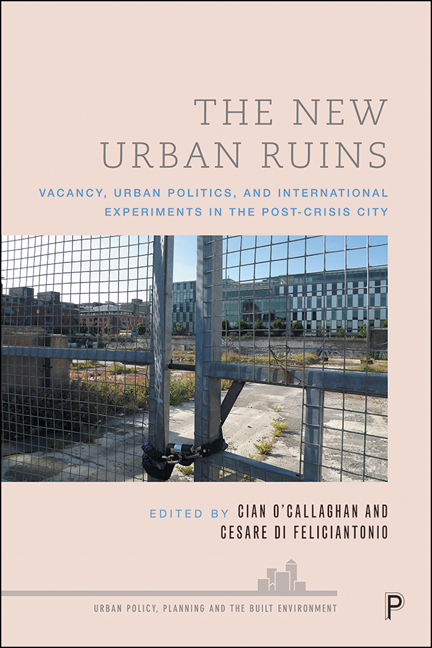Book contents
- Frontmatter
- Contents
- List of figures and tables
- Notes on contributors
- Acknowledgements
- Introduction
- PART I Rethinking ruination in the post-crisis context
- PART II The political economy of urban vacant space
- PART III Reappropriating urban vacant spaces
- Conclusion: Centring vacancy – towards a research agenda
- Index
10 - Politicising vacancy and commoning housing in municipalist Barcelona
Published online by Cambridge University Press: 13 May 2022
- Frontmatter
- Contents
- List of figures and tables
- Notes on contributors
- Acknowledgements
- Introduction
- PART I Rethinking ruination in the post-crisis context
- PART II The political economy of urban vacant space
- PART III Reappropriating urban vacant spaces
- Conclusion: Centring vacancy – towards a research agenda
- Index
Summary
Introduction
In summer 2014, I attended a public gathering in a small square in the Carpenters Estate, an East London council estate slated for demolition. The event was organised by a collective of single mothers called Focus E15 to mark the occupation of four vacant flats to raise awareness about the destruction of social rented housing in the borough of Newham. Within days, both the protest-occupation and the collective gained high visibility in the national media, becoming something of a flagship struggle in London's housing activism, as well as a clear inspiration for other direct actions against displacement, accumulation by dispossession and gentrification (Gillespie et al, 2018). In photographs, the occupation was usually framed by a large green banner, hanging in front of the facade: ‘These homes need people, these people need homes.’ The slogan drew attention to the need for social rented housing while denouncing a wasteful system. Powerfully and effectively, it presented a clear antithesis: vacant houses and unhomed people are to be brought together to solve a material, as well as rhetorical, tension. The slogan, I later discovered, had been directly inspired by the chant ‘gente sin casas, casas sin gente’ (‘people without homes, homes without people’) of the Platform of People Affected by Mortgages (PAH) in Spain (Di Feliciantonio, 2017; García- Lamarca, 2017). The ease with which the slogan had travelled between the two contexts evidences not only the important work of transnational solidarity and learning post-2008, but also the resurgence of a politicisation of vacant housing through direct action across the world (Dizon, 2019; Ferreri, 2020b; Noterman, 2020), which demands critical attention (see also the remaining chapters in Part III, this volume).
The connection between the needs of unhomed people and residential vacancy is a powerful rhetorical construct, with a long history. The politicisation of urban vacancy through the right of use above and beyond a title to property can be found throughout the histories and geographies of squatting and direct action (Blomley, 2008; Martínez López, 2017; Watson, 2017). In the Spanish context, the slogan powerfully captured the injustice of high levels of empty housing at times of increased precarisation and homelessness caused by the mortgaged-backed housing bubble and crash in 2008.
- Type
- Chapter
- Information
- The New Urban RuinsVacancy, Urban Politics, and International Experiments in the Post-Crisis City, pp. 181 - 196Publisher: Bristol University PressPrint publication year: 2021



